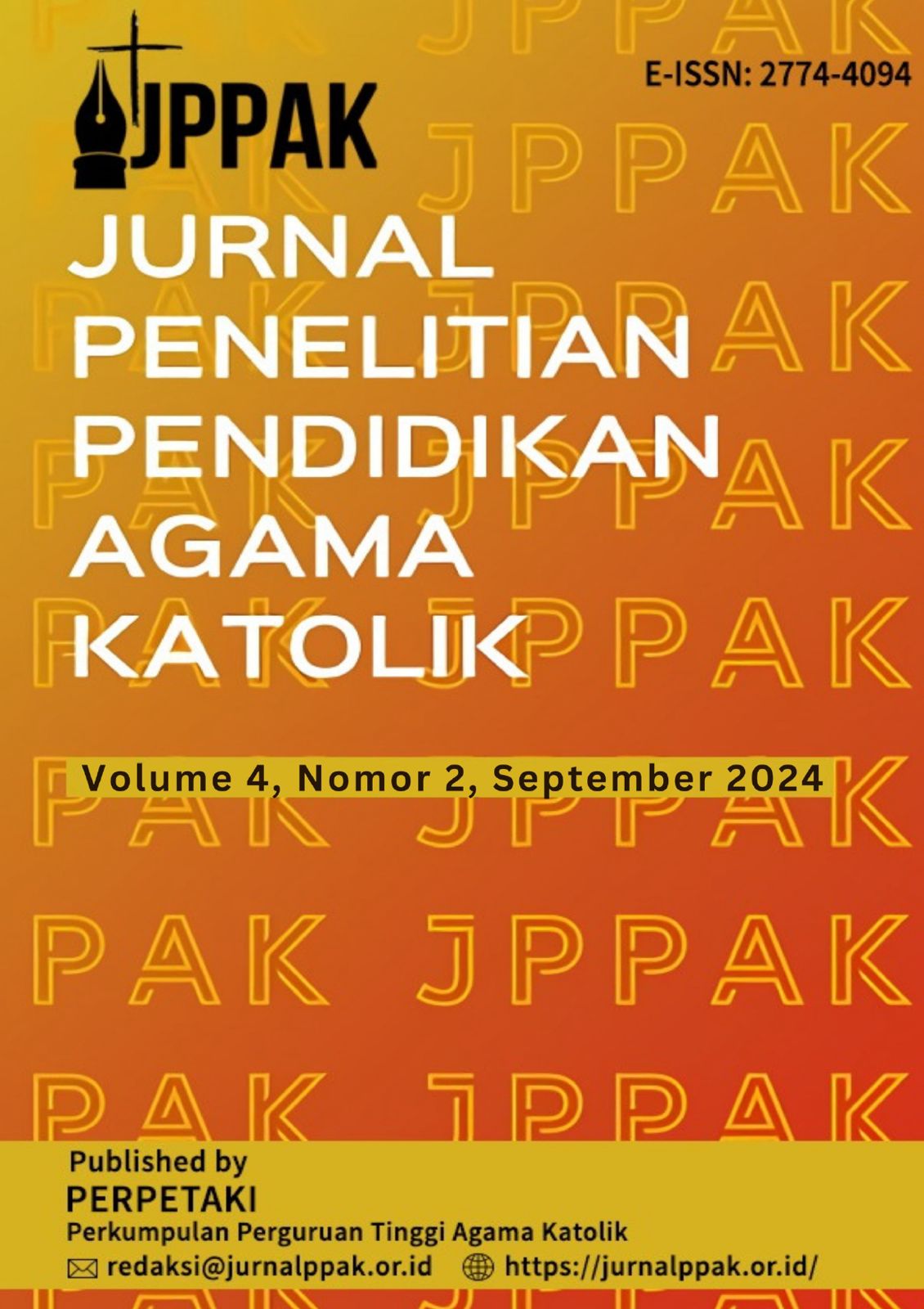Peran Katekis dalam Tantangan Karya Katekese Digital
DOI:
https://doi.org/10.52110/jppak.v4i2.163Keywords:
Role of the Catechist, Challenge, Digital CatechesisAbstract
Keywords:
Role of the Catechist; Challenge; Digital Catechesis
This research aims to find the role of catechists in the challenge of digital catechesis. In PKKI X, this awareness can be seen in the form of communication in catechesis finding new ways, namely digital communication. The Church sees the digital era, not only in terms of opportunities in terms of new ways of catechesis, but the Church also remains alert to the challenges in digital catechesis. These challenges certainly have a negative impact on the life of faith. Modern developments in the digital world have made humans experience memory loss or amnesia. Today's humans live in an all-digital era, making themselves dominated by technological networks. Modern humans only consist of flesh, bodies and machines, this is what makes them wrong. Humans actually have spiritual power. In order to restore people's memory of their identity as human beings who are noble and have spirituality, catechesis becomes a learning process to become more human. The Church must play an active role in the challenge of digital catechesis. So that negative impacts in the life of faith can be reduced and handled well, all lines in the Church must be involved in responding to this challenge, including a catechist. The catechist is the spearhead of the people, because the catechist understands the real situation that the people are experiencing. The challenges of digital catechesis influence the work of catechesis for the people. In the era of digital catechesis, catechists need to be involved and take a role in facing challenges in digital catechesis. This research is included in qualitative research with documentation methods. Data collection in this research was by finding data in documents related to the theme. After the data is collected, the next step is analyzing the data and interpreting the data. Based on the research results, it was found that in facing the challenges of digital catechesis, three important roles were found in a catechist. These roles are in the form of; a catechist must be able to master digital, the catechist becomes a facilitator who leads the people to an encounter with God, and the catechist becomes a partner of the Imams in the work of digital catechesis. This role is where a catechist should carry out his duties in the challenges of digital catechesis.
Downloads
##submission.downloads##
Submitted
Accepted
Published
How to Cite
Issue
Section
License
Copyright (c) 2024 Chechilia A. Banjarnahor, Intansakti Pius X

This work is licensed under a Creative Commons Attribution-ShareAlike 4.0 International License.
Copyright Notice and Permissions
Jurnal Penelitian Pendidikan Agama Katolik offers immediate open access to all its content on the principle to make researches freely available to the public, especially to the scholars, to support greater global exchanges of knowledge. This journal encourages all scholarly authors to allow their research openly available, free access and without time restrictions.
All articles published Open Access will be immediately and permanently free for everyone to read and download. Under the CC BY-SA 4.0 license, authors retain ownership of the copyright for their article, however authors grant others permission to use the content of publications in Jurnal Penelitian Pendidikan Agama Katolik (JPPAK) in whole or in part provided that the original work is properly cited. Users (redistributors) of Jurnal Penelitian Pendidikan Agama Katolik (JPPAK) are required to cite the original source by including at least: the full title of the article, the author's or authors' full name(s), JPPAK as the initial source of publication, year of publication and volume number using a propriate citing method.
Copyright encompasses exclusive rights to reproduce and deliver the article in all form and media, including reprints, photographs, microfilms and any other similar reproductions, as well as translations. The reproduction of any part of this journal, its storage in databases and its transmission by any form or media, such as electronic, electrostatic and mechanical copies, photocopies, recordings, magnetic media is prohibited without consent of Jurnal Penelitian Pendidikan Agama Katolik (JPPAK).
Jurnal Penelitian Pendidikan Agama Katolik (JPPAK) is licensed under a Creative Commons Attribution Share-Alike 4.0 International. (CC BY-SA 4.0)
Authors who publish with Jurnal Penelitian Pendidikan Agama Katolik (JPPAK) agree to the following terms:
- Authors retain copyright and grant the journal right of first publication with the work simultaneously licensed under a Creative Commons Attribution Share-Alike 4.0 International (CC BY-SA 4.0) license that allows others to share the work with an acknowledgement of the work's authorship and initial publication in this journal.
- Authors are able to enter into separate, additional contractual arrangements for the non-exclusive distribution of the journal's published version of the work (e.g., post it to an institutional repository or publish it in a book), with an acknowledgement of its initial publication in this journal.
- Authors are permitted and encouraged to post their work online (e.g., in institutional repositories or on their website) after the publication on JPPAK, as long as it not published on other OJS for it will be treated as plagiarism by plagiarism checker apps. It can lead to productive exchanges, as well as earlier and greater citation of published work (See The Effect of Open Access).












